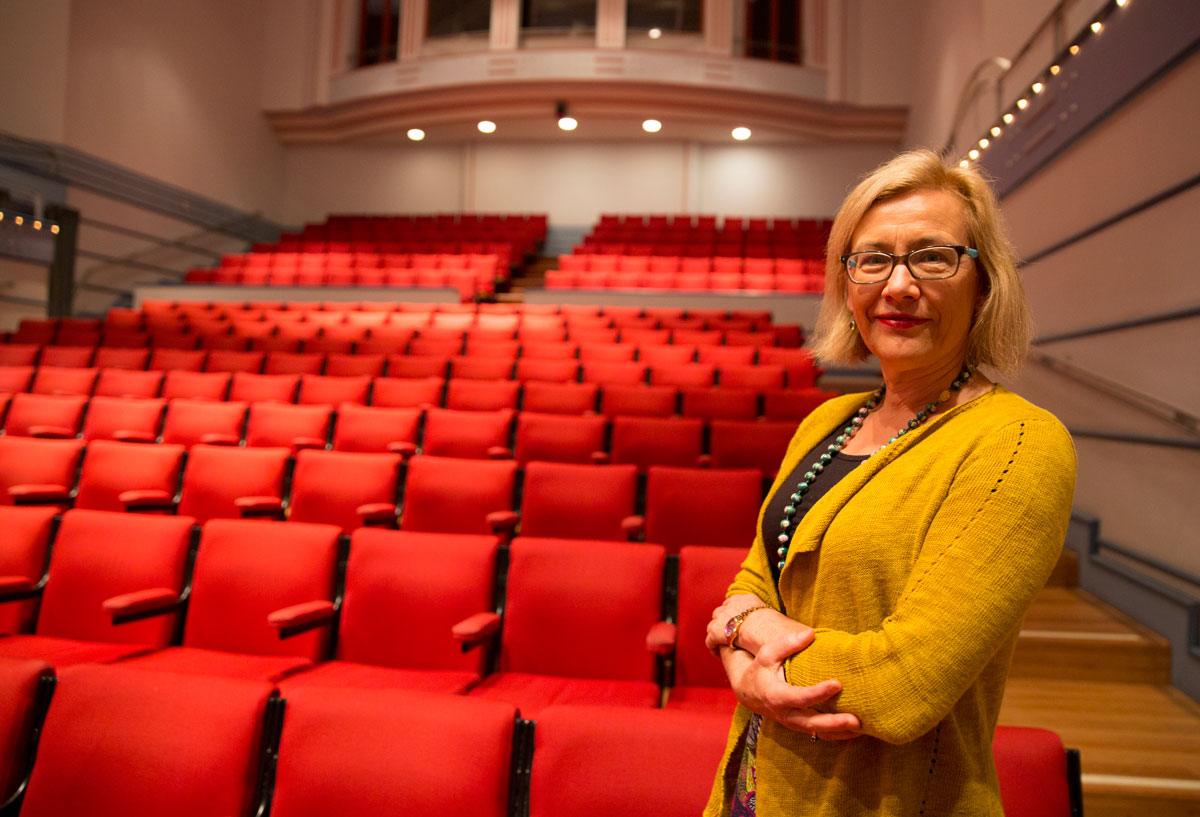Researcher Highlights
Considering cultural capacity
Dr Helen English
An insult attributed to Mark Twain following his fleeting visit to Newcastle in 1895 became the spark that led Helen English to investigate the cultural life of our emerging coal mining townships.

At the time of Twain’s visit, Newcastle was still emerging from the shadows of its origins as a notorious prison outpost.
Twain’s apparent assessment of Newcastle as consisting of “a long street with a graveyard at one end with no bodies in it, and a gentleman’s club at the other with no gentlemen in it” is the stuff of legends, despite questions regarding the authenticity of the quote.
In 2008, Helen was working on a soundscape inspired by Twain’s visit.
She became determined to unearth a more thorough representation of cultural life in the Coal City at the end of the 1800s, and question the negative picture represented by legend.
What she discovered was a bustling world of colour and music, competition and community, commiseration and celebration.
The forgotten musicians of Newcastle
Graduating from the prestigious Guildhall School of Music & Drama in London, Helen worked as a professional musician for many years.
She is a talented aficionado of the piano and harpsichord.
A move to Tasmania in 1995 and motherhood redirected Helen into pursuits more practical than the life of a travelling musician and she dabbled in musicology.
Coming to Newcastle in 2000, Helen enrolled in a Masters degree.
She was appointed Associate Lecturer at the University of Newcastle in 2003, and has since completed her PhD.
Researching music and community in Newcastle and Maitland, her interest in social justice issues, and a lack of existing musicological study on the regional working class, inspired Helen to hone in on her thesis topic, ‘Music as a Resource for World-Building in Newcastle and its Townships, 1869-1879.’
Taking her research one step further, Helen has presented on "Forgotten Musicians of Newcastle" at several forums and recorded much of the surviving music by these composers from the period 1860-1880.
Processions, picnics and parades
Giant personalities such as Mark Dent and Thomas Jones pepper Helen’s work.
Dent, blackballed following his involvement in an unsuccessful 1844 petition to English Parliament regarding dangerous working conditions, came to Australia and found work and community in Lambton.
Jones organized a community concert in Lambton, NSW, as a testimony to John Griffiths, who led a 400 strong choir from South Wales to London in 1872 and 1873, where they blitzed the competition at the choral games two years running.
These larger than life personalities, and many like them, rarely saw any financial benefit from their commitment to community and place making through music. What was their motivation?
“Drawing on social theory, I try to look at music not just as something that people did, but what it was doing for them,” Helen explains.
“Music was empowering people, or creating community, or helping them keep working when they were tired, or just creating a familiar context.”
Helen’s work tells of processions and picnics, fundraisers and concerts, of communities bonded together by the hardships and opportunities presented by a fledgling city.
Music and world building
Her understanding of the effects of music on the body, mind, and emotions uniquely qualify Helen for a role with the ARC Centre of Excellence for the History of Emotions (CHE), for whom she has recently been appointed an Associate Investigator.
Helen has received funding from the Centre to investigate amateur blackface minstrelsy in the Hunter Valley.
“People are embarrassed to hear about it now, but it doesn't mean you can't investigate it, why was it so important to people, so popular?” she asks.
Helen is also collaborating with Deputy Director of the Centre, Professor Jane Whitfield Davidson (University of Melbourne), on a project titled ‘Music and World-Building: From Past to Present’.
The co-researchers are investigating current music communities informed by research into historical communities.
Through looking at pre-existing music-making, the researchers seek to understand how music can be used to build and replenish community capacity.
Building community capacity
Helen is now a Senior Lecturer for the UON School of Creative Industries, teaching into a range of diverse courses including Music Research, Australian Music, and Piano.
It is her current role as Director of School and Community Engagement however, that sees Helen translating the theoretical capacity building of her research into real life outcomes.
With funding from the Commonwealth Government Higher Education Partnerships and Participation Program (HEPPP) and UON Centre for Excellence of Equity in Higher Education (CEEHE), Helen has orchestrated several projects in partnership with local schools.
These projects focus on bolstering music literacy and building aspirations in the creative and performing arts in school students.
One project saw UON student mentors working with students from seven schools to develop performance pieces, culminating in a showcase of their works at the Griffith Duncan Theatre.
Consultation with staff at several local schools has led Helen to coordinate a network of high school music staff, and further opportunities for students are in development.
Helen is also co-leading a research project with Matt Lumb from CEEHE, ‘Music, belonging, and transformation: Understanding the impact of outreach to low SES high schools in fostering and supporting aspirations’.
The University of Newcastle acknowledges the traditional custodians of the lands within our footprint areas: Awabakal, Darkinjung, Biripai, Worimi, Wonnarua, and Eora Nations. We also pay respect to the wisdom of our Elders past and present.
